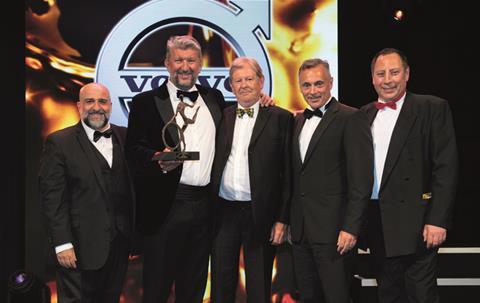
Culina Group has shown it knows how to maximise its successes, admit its failures and constantly lift performance.
Culina Group celebrated its 25th anniversary in 2019 by collecting the Haulier of the Year trophy at the Motor Transport Awards 2019 in July.
CEO and larger-than-life Dutchman Thomas van Mourik set the firm up and has navigated it from small beginnings as Müller Dairies’ distribution arm into a £650m a year temperature controlled and ambient logistics giant that sat at number 13 in the 2018 Motor Transport Top 100.
The story starts in 1994 when van Mourik was asked by the owner of Müller Dairies Theo Müller to come to the UK to set up Culina Logistics.
The name Culina is not the combination of anyone’s initials or the middle name of the founder’s daughter, as some believe. Its origins are far more prosaic as van Mourik explains: “Culina was started in Germany by Theo Müller before he had any involvement in distribution,” he says. “His big example in business life was the Oetker family who founded the Dr Oetker brand. They were into pizzas and Theo wanted to start up in pizzas too – and that brand would have been Culina.
“That never happened so he had a limited company sitting on the shelf called Culina. At the time there was a government-set tariff for any road transport in Germany so there was no room for any negotiation with customers. The industry was highly regulated and protected so no foreign company could do any national transport in Germany. You had to go to the government to get those permits so the only thing you could do was buy a German company with those permits and then you could make a lot of money.
“Theo saw the profits the transport companies were making and thought ‘I might as well have my own transport business’, so he bought a couple of companies and put them together under the name Culina. As Müller grew its presence in the German dairy sector Culina grew with it. At one stage it was probably the largest chilled operator in Germany and it started to do third-party work on the back of Müller’s volumes.”
Setting up in Shropshire
Müller’s success selling dairy products, especially yogurt in the UK, meant that in the early 1990s the UK supermarkets wanted him to have his own distribution operation. So Müller set up shop in Shropshire at the heart of UK milk production.
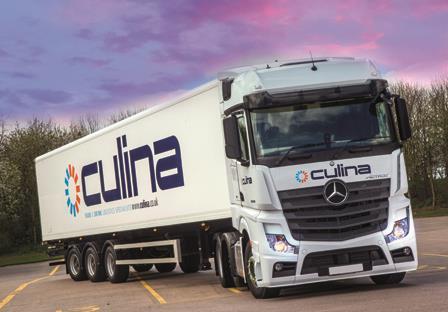
“Ken Wood was at the time the pioneer of Müller in the UK. He was in charge of sales and marketing and production and now he found himself in charge of distribution,” says van Mourik. “So it went horribly wrong. Here was a salesman in charge of production, warehousing and transport – and it was a complete mess. I happened to live in the same village as Theo Müller and we got to know each other.
“He knew I had lived in the UK previously and asked if I would set up Culina in the UK. By then I had had five years working for a Dutch company in Germany and was ready for a change.”
Rural Shropshire sounded quite appealing so van Mourik moved his family over and set up Culina Logistics on 1 January 1994.
At the time Müller product was stored in a GroContinental warehouse at Prees Green near Whitchurch run by Müller with Wincanton doing the transport, and van Mourik took over these contracts.
“All the Müller guys were transferred to Culina and the Wincanton contracts became my responsibility,” he says. “Within a fortnight we halved the warehouse workforce because it had been so inefficient and by the end of the year we served notice to Wincanton and put our first trucks on the road.”
Automating the future
By 1996 the original warehouse had become too small so Culina started developing an automated warehouse in Market Drayton next to the Müller dairy. At 15,000 pallet spaces it was at the time three times bigger than Müller needed so that gave Culina the opportunity to go after third-party contracts.
“The first customer we landed was Kraft Jacobs Suchard, which is now Mondelez, a customer of Wincanton,” says van Mourik. “They were used to an automated environment as they had product in a large automated store in Germany where Culina did all the transport.
“We then had a bit of luck. We came into contact with Tropicana, which was then owned by Seagram, and they wanted distribution and sales in the UK. So we did a combined deal with Müller and Culina and that acorn grew into a oak tree.”
Tropicana and Müller’s growth quickly filled the original Market Drayton warehouse so van Mourik had to find a second location. This was in Milton Keynes and when it opened in 2001 it was Culina’s first pure third-party site.
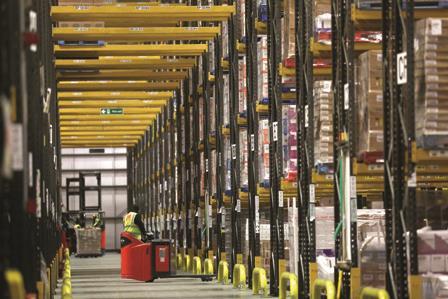
Hanbury Davies was appointed as a dedicated sub-contractor which is when van Mourik’s long relationship with Glyn Davies – who is still a non-executive director of Culina – was cemented.
“I knew Glyn before but that is when we started working together a lot more closely,” says van Mourik. “We repeated that model over and over again and ended up with sites in Market Drayton, Milton Keynes, Stafford, Haverhill and Bristol. We had quite a bit of spare space and I saw an opportunity to do a deal with Wincanton.”
Wincanton at the time under then CEO Graeme McFaull was undisputed king of shared user chilled distribution, with turnover of £150m compared with Culina’s £7.5m.
“I sat down with Graeme and proposed a joint venture, but he wasn’t interested,” says van Mourik. “So I said I was happy to buy their £76m chilled business but I didn’t want their people, trucks or warehousing and I certainly didn’t want their culture as it was not compatible with Culina.
“He said that was not possible so I offered to pay Wincanton a sum of money, grant them a 20% shareholding in Culina Logistics and move their customers over to us. So we did the deal, which was unique and quite complicated. Effectively we bought the revenue which was a big step change for us.”
Soon after it signed the deal with Culina, Wincanton ran into difficulties after some disastrous acquisitions that saw the share price fall to 30p and McFaull step down as CEO. He was replaced by Eric Born who was tasked by the shareholders with turning the company around.
“Eric was in need of some cash and he asked us to buy his 20% stake in Culina,” says van Mourik. “So Müller ended up again being the 100% owner of Culina Logistics.”
Big mistake
Just before the Wincanton deal, Culina made its first move into ambient distribution with the acquisition of Baylis Transport which became Culina Ambient.
“That’s where we made a big mistake,” admits van Mourik. “We thought we knew everything about chilled distribution and an ambient business would just fall in line. We drove service, profit and morale down. It was a car crash.
“So we invested in a new facility in Port Salford to take things forward, but whenever we were in a tender we ran into Great Bear, who in most cases won. They were very professional and I thought ‘I’ve got to sell the ambient business or buy Great Bear’.”
Luckily the circumstances were right and van Mourik got on well with Great Bear MD David Williams.
“We agreed to purchase the business and we folded our ambient business into Great Bear which had a turnover of £60m and 600 people who were transferred across,” says van Mourik. “The ailing business that was Culina Ambient turned into a positive and the rest is history.”
Great Bear now turns over nearly £280m, a success story that van Mourik largely puts down to keeping the management team intact.
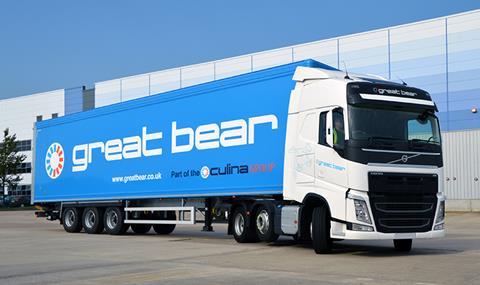
“The one big thing I learned with Baylis was that you keep the company the way it is,” he says. “In the case of Great Bear, which has people who had given 25 years of their life building it up, you don’t dive in and say ‘we’re going to do it the Culina way’. Just let them get on with it” (see 'Central service, not central control' below).
In 2014 Culina took the next step in its development when it started working with Telford-based CML Fulfilment.
“CML does cross-docking, storage and distribution on behalf of customers who trade with Aldi and Lidl,” says van Mourik. “Having lived in Germany I knew what those discounters are capable of in terms of market dominance and I wanted to be part of it. So I got involved in a business that was already well in with them. Over a number of years we bought the shares and now own CML 100%.”
CML handles around 45,000 pallets a week but had no transport, preferring to rely on a sub-contractor, Northern Irish refrigerated specialist Morgan McLernon Transport.
“We thought it was far better to do a deal with Morgan McLernon than say goodbye and put our own trucks in,” says van Mourik. “So in 2017 we did a deal with Michael McLernon where we own 75% of that business. We wanted Michael to stay and grow the business and he then had an opportunity to take on all the Irish work we were giving to sub-contractors. So we gave all the other group work to Michael and we will carry on developing that.”
Van Mourik also wanted to take on the “Spalding mafia” and get into perishable foods distribution from East Anglia where the majority of the UK’s fresh fruit, vegetables and salads are grown or imported.
In 2012 he tried to buy Browns Chilled Distribution, a £35m a year business based in Bicker near Spalding, but saw it snapped up by Turners (Soham) from under his nose.
“So I knew I had to be discreet and buy another business,” van Mourik says. “That was Robsons of Spalding. So albeit in a small way we are now in Spalding. It is a £17m turnover business and we have great plans to develop it. We are keeping the name and the management team in place.”
That was in 2018 and, in the same year, the next food sector that van Mourik decided to get involved in was morning goods – bread, cakes and pastries. Researching the market, he came across Warrens Group, a Sidcup-based logistics firm specialising in baked goods, with 150 trucks and a turnover of £37m a year.
“Warrens is the market leader, a low profile, second generation company,” he says. “They never have their name on the side of the trucks. I made contact and did a deal where we have 75% of the company. The other 25% stays with Michael Warren and we want to help him grow the business.”
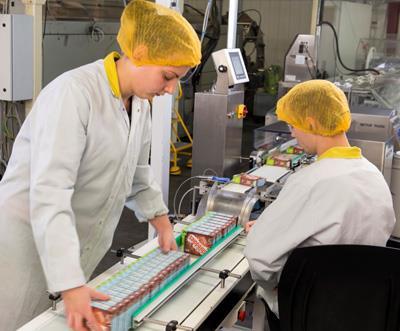
Packing ’em in
The eighth and final piece in the Culina jigsaw – for now anyway – is the co-packing business which will turn over £73m this year.
“That started on the back of Culina Logistics when it was still small, doing a bit of packing in the corner of a warehouse,” says van Mourik. “It wasn’t really working so we got in contact with IPS [Integrated Packing Services] in Featherstone [West Yorkshire] where they were doing co-packing, and they also had an in-house operation with Nestle in York. IPS needed cash to invest in machinery and also had to convince customers to bring product to Featherstone for reconfiguring and then take it back into warehousing, which was extra cost.
“So in 2015 I proposed a 50/50 joint venture where I put all my turnover and IPS put all its know-how and machinery in, and we grew it jointly.
“After three years we had such momentum that I wanted to buy out their 50%. At that meeting we ended up buying IPS as well. So we put the two businesses together and the same management is driving it forward.”
As well as Featherstone, IPS now has an operation in most of Culina’s warehouses, has a joint venture with Eddie Stobart Logistics and has a site in Dudley. Last year it bought its first co-manufacturing site Foodpack in St Helens on Merseyside. “It’s the glue that keeps everything together,” says van Mourik. “If you do warehousing and transport pretty well in a shared user environment, and overlay that with a unique co-packing or co-manufacturing solution, that customer will think twice about awarding that contract to someone else.”
A happy cobbler
While van Mourik is always looking for new opportunities to offer his clients more services and lock them into Culina, he says the company will always “stick to its shoemaking” rather than expand outside its area of expertise.
“We do just about everything that goes into a supermarket except frozen – yet,” he says. “It might come, it might not – the opportunity has to be there.
“We have no need to diversify beyond FMCG and food and drink – there is enough growth in the sectors in which we operate at the moment. What we have done this year is take on the distribution for Müller Milk and Ingredients, which is the old Wiseman and Dairy Crest business. We are also going to take on the tanker fleet to do the milk collection so that is another £225m turnover on top of Culina’s £650m.
“Maybe we will go further up or down the supply chain as bulk ingredients would be a natural extension for us. If one of our customers wanted us to start hauling raw materials into their factory, we would have a look at it. What we won’t do is suddenly go out and buy a container business. That makes no sense.”
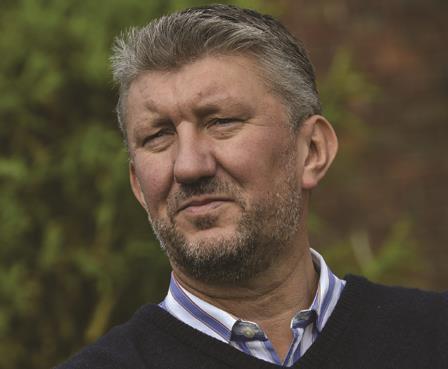
Valuing people
The Culina management is very aware that delivering the best service requires the best people, and van Mourik says it is getting “increasingly difficult” to recruit and retain good staff at all levels.
“We have to disproportionately involve ourselves with the people who are working for us,” he says. “For example, if you turn 21, or 40 or 50 or 60, I will personally send you a card. If you are employee of the month in any depot, I send a card. If a baby is born, I will send the parents a card.
“Every year we do a roadshow and I will go to all 65 depots, and speak to as many people as possible, and first and foremost I say ‘thank you’. Then we review the year, what went well, what not so well and what we will do better next year.
“The HR director will talk about the training and career development we have available and how people can go from the warehouse through our academy to become a driver or move from one depot to another to get promotion.
“We run employee surveys across the business and we go through the results.
“Finally the MD of the business will home in on what is important specifically for the people at that particular depot.
“It takes me two months every year to do that roadshow and it is exhausting but totally worthwhile.”
To mark the 25th anniversary, Culina hired Alton Towers for the weekend and invited the whole company to come along and have the run of the place.
While wages are important to staff retention, van Mourik says it is equally important that people feel valued. But logistics is a demanding industry that has to respond to customers’ needs, sometimes at short notice, so how does Culina meet the needs of staff and customers?
“By giving our people flexible hours,” says van Mourik. “We have people who don’t want to work 12-hour days but might want to do eight hours three times a week. That’s the reality of life today. We have to interact with our people in a far more social manner than we did 20 years ago.
“I know that if I do not treat the guys well they will not do what is expected of them and the service will go down.
“We have an expression – ‘a fish will always start stinking at the head, not the tail’ – so this culture has to come from the top. I always treat people how I would want to be treated myself and over time that culture will flow down through the company.”
A fair rate for the job
The ultra-competitive nature of the logistics market means customers are constantly looking to play the 3PLs off against each other, driving rates down to unsustainable levels in recent years. Van Mourik says that rising vehicle and wage costs have to be passed along at some point otherwise the 99% service levels customers have grown used to will start to suffer.
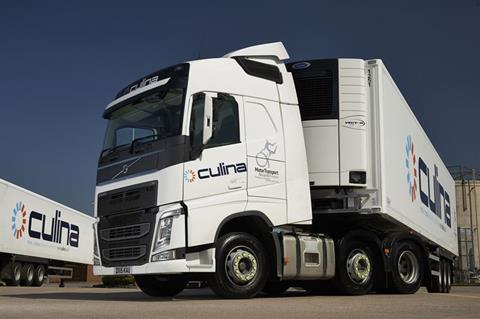
“They have got to listen,” he says. “Over time everything goes up. Sometimes it doesn’t happen quickly enough but it has to happen. If we don’t get a correction then we are out business, it is as simple as that.
“Take Brexit – whatever we get, the bill will be there soon and who is going to pay for it?”
So far Culina has been relatively unaffected by the internet shopping boom, as its business is mainly delivering FMCG and food products into the retail supply chain.
“In food and drink we haven’t seen e-commerce rolled out yet,” van Mourik says. “When it comes to cosmetics, yes, it is there and we are creating a solution to that for our clients. But we are not like Clipper, where in clothing e-commerce is dominant. Predominantly we work for manufacturers, storing and delivering their products to retailers, mostly in a shared user environment.”
Central service, not central control
While the Culina group companies share central services like fleet purchasing, IT, HR, marketing and finance, the operational teams are kept separate, and allowed to run their businesses independently.
This means they do not share assets such as vehicles; nevertheless the company double-shifts every truck to maximise productivity.
“Across the business we cover off 70% of our transport requirement with our own fleet, with the rest going through sub-contractors,” says van Mourik. “They are our flexible friends and we sweat our vehicles as much as we can.
“We never have trucks standing. There is an open dialogue between the businesses so if for example a Culina truck comes into Spalding the driver will call Robsons and ask for a load out. That candy store of transport is open to all our businesses.”
While being able to share resources is one of the advantages of being part of large group, van Mourik says each business owns its P&L and he doesn’t want any centralised control.
“That ownership and entrepreneurial attitude is what we want to hold onto as much as possible,” he says. “In all the businesses we bought, the management is still in place to a large extent. If it wants to buy a company the group will provide it with the funds and the support. If it wants to develop a new IT system we will have our central IT team get involved and support that on a local level.
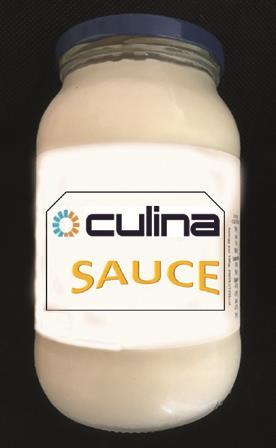
“We are not constantly pouring the Culina sauce all over these businesses. The biggest lesson I learned when we bought that ambient business was not to try to Culina-ise it – it went wrong. I have never done that since.”
Van Mourik illustrated this point at a Culina management conference where he had the label on a jar of mayonnaise made into a ‘Culina sauce’ brand. “I used it to tell the story that the worst thing you can do is spread the Culina sauce all over every company because it won’t work,” he says.
The MT Awards judges agreed, citing Culina’s excellent track record in managing acquisitions as one reason for making it Haulier of the Year.











